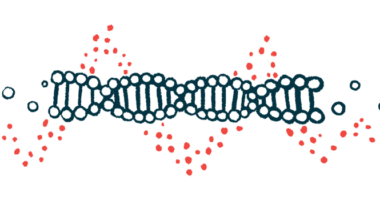FDA approves eplontersen, now Wainua, for treating FAP in adults
Given monthly, therapy likely to reduce treatment burden vs. weekly Tegsedi

The U.S. Food and Drug Administration (FDA) has approved eplontersen for treating familial amyloid polyneuropathy (FAP).
The therapy, which will be sold under the brand name Wainua by its co-developers Ionis Pharmaceuticals and AstraZeneca, is specifically indicated for adults with the genetic disease. In a previous Phase 3 trial, Wainua was shown to significantly slow disability progression and improve quality of life in adults.
The approval makes Wainua the first and only FAP therapy that can be self-administered by patients through an autoinjector. Administered once monthly under the skin, or subcutaneously, at a dose of 45 mg, Wainua is expected to be a potential successor to Tegsedi (inotersen) — or at least a possibly less burdensome approach relative to the older Ionis therapy. That approved FAP treatment has a similar mechanism of action to the new Wainua, but is given once a week.
“The FDA approval of Wainua marks an important milestone for people living with [FAP], who will now have an effective, well-tolerated treatment that can be self-administered via auto-injector to combat this devastating disease,” Brett P. Monia, PhD, chief executive officer at Ionis, said in a company press release.
The newly approved therapy, whose list price has not yet been disclosed, will be available in the U.S. next month.
Companies seeking approval of Wainua in other countries
Ionis and AstraZeneca also are working to win approvals of Wainua in Europe and other countries outside the U.S. AstraZeneca holds exclusive commercialization rights to the therapy in these regions, which now include Latin America.
“We are proud to have discovered and, together with AstraZeneca, developed Wainua, and are grateful to the patients, caregivers and investigators who participated in our clinical studies, as well as for the dedication of our scientists and researchers,” Monia said.
FAP, also called hereditary transthyretin-mediated amyloid polyneuropathy, is caused by mutations in the TTR gene , which provides instructions for making a protein called transthyretin.
As a result, an abnormal version of transthyretin is produced that forms toxic clumps that accumulate in tissues, mostly in the nerves outside the brain and spinal cord. This results in nerve damage that causes FAP symptoms.
Wainua is an RNA-targeted therapy designed to reduce transthyretin production. The therapy works essentially the same as Tegsedi, but Wainua is engineered to be better at getting into the liver, the main producer of transthyretin.
Both subcutaneous therapies can be self-administered at home with appropriate training. Tegsedi is given once a week, but the second-generation therapy is administered once a month, likely reducing the treatment burden for patients.
Wainua shown to slow disability progression in global trial
Ionis’ application for the approval of Wainua was based mainly on interim 8-month data from a global Phase 3 clinical trial called NEURO-TTRansform (NCT04136184). In that trial, which enrolled adults with stage 1 or 2 FAP, a total of 144 patients were treated with Wainua.
Interim data showed that the therapy significantly reduced, by 81.2%, blood transthyretin levels. It also was associated with a significantly slower rate of disease progression, as measured by the modified Neuropathy Impairment Score +7.
Moreover, treatment resulted in a significantly better quality of life for patients, as assessed by the Norfolk Quality of Life Questionnaire-Diabetic Neuropathy.
Across these measures, Wainua consistently showed better results compared with an external group of FAP patients given a placebo in a previous Tegsedi Phase 2/3 trial (NCT01737398).
Full trial results were published a few months ago, showing that a little more than a year of treatment decreased transthyretin levels by 81.7%, and led to reductions in disability related to nerve damage in 47% of patients. Quality of life improvements were seen for 58% of participants.
Longer-term data from NEURO-TTRansform suggested the therapy’s effects were sustained through more than 1.5 years of treatment.
Approval of Wainua represents a meaningful advancement in treatment.
Wainua was generally well tolerated. According to the therapy’s label, its most common side effects include reduced levels of vitamin A in the blood and vomiting. Patients starting on Wainua should be given vitamin A supplements.
“Many people living with hereditary transthyretin-mediated amyloid polyneuropathy are unable to fully enjoy their lives because of the relentless, progressive and debilitating effects of the disease,” said Michael J. Polydefkis, MD, professor of neurology at Johns Hopkins University School of Medicine and a NEURO-TTRansform’s investigator.
“Approval of Wainua represents a meaningful advancement in treatment,” Polydefkis said.
Eplontersen also is being evaluated as a potential treatment for transthyretin-mediated amyloid cardiomyopathy — an FAP-related disorder in which toxic transthyretin clumps mainly damage the heart muscle — in the Phase 3 CARDIO-TTRansform trial (NCT04136171).
The global, placebo-controlled study enrolled more than 1,400 patients, “making it the largest study in this patient population to date,” the release stated.
Wainua’s approval was hailed by research and advocacy groups.
“It is exciting to see new innovations coming through and increased efforts to raise awareness in an area that has often been overlooked or neglected,” said Isabelle Lousada, president and CEO of the U.S.-based Amyloidosis Research Consortium.
“People with hereditary transthyretin-mediated amyloid polyneuropathy, and other forms of amyloidosis, are often misdiagnosed since symptoms can mirror other conditions,” Lousada said.








